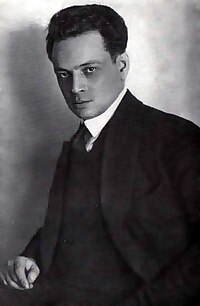Yury Tynyanov
Yury Tynyanov | |
|---|---|
 | |
| Born | Yury Nikolaevich Tynyanov October 18, 1894 Rezhitsa, Russian Empire |
| Died | December 20, 1943 (aged 49) Moscow, USSR |
| Resting place | Vagankovo Cemetery, Moscow |
| Occupation | Writer, screenwriter, translator, literary critic, scholar |
| Language | Russian |
| Notable works | Lieutenant Kijé |
Yury Nikolaevich Tynyanov (Russian: Ю́рий Никола́евич Тыня́нов, IPA: [ˈjʉrʲɪj nʲɪkɐˈlajɪvʲɪtɕ tɨˈnʲænəf]; October 18, 1894 – December 20, 1943) was a Soviet writer, literary critic, translator, scholar and screenwriter.[1] He was an authority on Pushkin and an important member of the Russian Formalist school.
Biography[]
This section needs expansion. You can help by . (July 2018) |
Yury Tynyanov was born in Rezhitsa, Vitebsk Governorate, Russian Empire (present-day Rēzekne, Latvia). His brother-in-law was Veniamin Kaverin, another well-known Russian author. While attending the Petrograd University, Tynyanov frequented the Pushkin seminar held by a venerable literary academic, Semyon Vengerov. His first works made their appearance in print in 1921.
He died of multiple sclerosis in Moscow.
Major works[]
In 1928, together with the linguist Roman Jakobson, he published a famous work titled Theses on Language, a predecessor to structuralism (but see Ferdinand de Saussure), which could be summarised in the following manner (from ref.[2]):
- Literary science had to have a firm theoretical basis and an accurate terminology.
- The structural laws of a specific field of literature had to be established before it was related to other fields.
- The evolution of literature must be studied as a system. All evidence, whether literary or non-literary must be analysed functionally.
- The distinction between synchrony and diachrony was useful for the study of literature as for language, uncovering systems at each separate stage of development. But the history of systems is also a system; each synchronic system has its own past and future as part of its structure. Therefore the distinction should not be preserved beyond its usefulness.
- A synchronic system is not a mere agglomerate of contemporaneous phenomena catalogued. 'Systems' mean hierarchical organisation.
- The distinction between langue and parole, taken from linguistics, deserves to be developed for literature in order to reveal the principles underlying the relationship between the individual utterance and a prevailing complex of norms.
- The analysis of the structural laws of literature should lead to the setting up of a limited number of structural types and evolutionary laws governing those types.
- The discovery of the 'immanent laws' of a genre allows one to describe an evolutionary step, but not to explain why this step has been taken by literature and not another. Here the literary must be related to the relevant non-literary facts to find further laws, a 'system of systems'. But still the immanent laws of the individual work had to be enunciated first.
Tynyanov also wrote historical novels in which he applied his theories. His other works included popular biographies of Alexander Pushkin and Wilhelm Küchelbecker and notable translations of Heinrich Heine and other authors.
Selected bibliography[]
In English[]
Works by Yury Tynyanov
- Formalist theory, translated by L.M. O'Toole and Ann Shukman (1977)
- Death of the Vazir-Mukhtar, translated by Susan Causey (edited by Vera Tsareva-Brauner), Look Multimedia (2018)
- The Death of Vazir-Mukhtar, translated by Anna Kurkina Rush and Christopher Rush, Columbia University Press, 2021 (The Russian Library)
- Lieutenant Kijé / Young Vitushishnikov: Two Novellas (Eridanos Library, No. 20), translated by Mirra Ginsburg (1990)
- Lieutenant Kizhe, translated by Nicolas Pasternak Slater, Look Multimedia (2021)
- "Permanent Evolution: Selected Essays on Literature, Theory and Film" translated and edited by Ainsley Morse & Philip Redko (2019, Academic Studies Press)
Works edited by Yury Tynyanov
- Russian Prose, edited by Boris Mikhailovich Eikhenbaum and Yury Tynyanov, translated by Ray Parrot (1985)
In Russian[]
Novels:
- Кюхля, 1925
- Смерть Вазир-Мухтара, 1928
- Пушкин, 1936
Novellas and stories:
- Подпоручик Киже, 1927
- Восковая персона, 1930
- Малолетный Витушишников, 1933
- Гражданин Очер
On Pushkin and his era:
- Архаисты и Пушкин, 1926
- Пушкин, 1929
- Пушкин и Тютчев, 1926
- О "Путешествии в Арзрум", 1936
- Безыменная любовь, 1939
- Пушкин и Кюхельбекер, 1934
- Французские отношения Кюхельбекера, 1939
- Путешествие Кюхельбекера по Западной Европе в 1820 – 1821 гг.
- Декабрист и Бальзак.
- Сюжет "Горя от ума", 1943
Notes[]
- ^ H.T.S. (December 10, 1934). "Czar Paul on Screen Again". The New York Times.
- ^ Rusform at mural.uv.es
External links[]
- 1894 births
- 1943 deaths
- People from Rēzekne
- People from Rezhitsky Uyezd
- Latvian Jews
- Russian formalism
- Russian male novelists
- Soviet short story writers
- Soviet novelists
- 20th-century Russian short story writers
- Saint Petersburg State University alumni
- Deaths from multiple sclerosis
- Neurological disease deaths in Russia
- Burials at Vagankovo Cemetery
- Russian male short story writers
- 20th-century novelists
- 20th-century Russian male writers
- Belarusfilm films